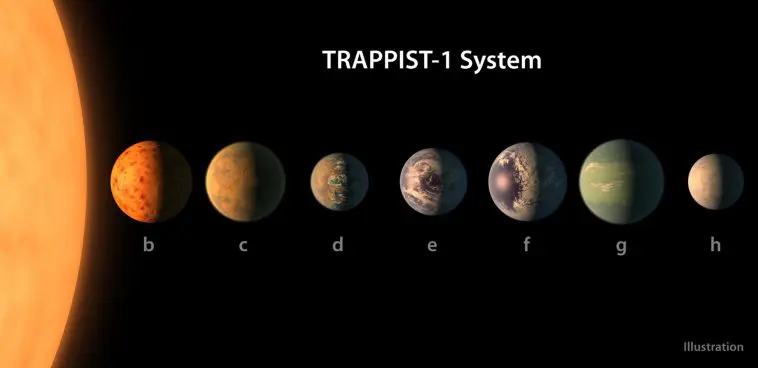[Originally published in 2017 as Life on Other Planets]
Let them praise the name of the LORD: for he commanded, and they were created. (Psalm 148:5)
Recently the National Aeronautics and Space Administration (NASA) created quite a stir concerning the discovery of seven earth-sized planets around the TRAPPIST-1 System. Several of the scientists were absolutely gobsmacked and giddy over the prospect of the possibility of life on these planets.
“For thousands of years, people have wondered, are there other planets like Earth out there? Do any support life?” said Sara Seager, astrophysicst [sic] and planetary scientist at MIT. “Now we have a bunch of planets that are accessible for further study to try to start to answer these ancient questions.“
Given the propensity of these scientists to reject the supernatural creative acts of God, they understandably seek proof of spontaneous generation on other worlds where they are free to speculate to their heart’s content. Failing to prove evolution here on earth, they hope to prove it elsewhere where their speculations escape scrutiny.
It is bad enough that they suck the mindless masses into the void of fantasy, but sadly, many “Bible-believing” Christians get sucked into the same vortex. I received an email from such a one just recently that read as follows:
While I am in agreement with the thought that the universe is God’s creation I’m not sure I understand comments that suggest life is impossible anywhere else. While we know the Bible is truth, there is truth outside of the Bible. God may have created life elsewhere for His purposes, what am I missing?
The writer referred to an article recently published by the Institute for Creation Research about the seven newly discovered exoplanets.
While many cautiously practice speculating about non-disclosures in the Bible, danger lurks when personal opinions become truths that can lead the believer astray. So for this one, and others that may be going off on a tangent, I offer the following:
The best resource to address the question of life on other worlds is the Bible
For thus saith the LORD that created the heavens; God himself that formed the earth and made it; he hath established it, he created it not in vain, he formed it to be inhabited: I am the LORD; and there is none else. (Isaiah 45:18)
And God created great whales, and every living creature that moveth, which the waters brought forth abundantly, after their kind, and every winged fowl after his kind: and God saw that it was good. (Genesis 1:21)
And God made the beast of the earth after his kind, and cattle after their kind, and every thing that creepeth upon the earth after his kind: and God saw that it was good. (Genesis 1:25)
So God created man in his own image, in the image of God created he him; male and female created he them. (Genesis 1:27)
And the Word [i.e., the Lord Jesus Christ] was made flesh, and dwelt among us, (and we beheld his glory, the glory as of the only begotten of the Father,) full of grace and truth. (John 1:14)
The Bible defines “life” more narrowly than how secular scientists define life.
For the life of the flesh is in the blood: and I have given it to you upon the altar to make an atonement for your souls: for it is the blood that maketh an atonement for the soul. (Leviticus 17:11)
For it is the life of all flesh; the blood of it is for the life thereof: therefore I said unto the children of Israel, Ye shall eat the blood of no manner of flesh: for the life of all flesh is the blood thereof: whosoever eateth it shall be cut off. (Leviticus 17:14)
Basically, no blood, no life.
So, if the question has to do with “life forms” such as bacteria, plants, or things like that, it is possible that such things could exist on other planets.
However, one must ask, what would be the purpose?
God does not create anything without purpose. What was God’s purpose for creating here on earth? (Bearing in mind that God created earth before any other heavenly body.)
Even every one that is called by my name: for I have created him for my glory, I have formed him; yea, I have made him. (Isaiah 43:7)
The glory of the LORD shall endure for ever: the LORD shall rejoice in his works. (Psalm 104:31)
I have made the earth, and created man upon it: I, even my hands, have stretched out the heavens, and all their host have I commanded. (Isaiah 45:12)
And all men shall fear, and shall declare the work of God; for they shall wisely consider of his doing. The righteous shall be glad in the LORD, and shall trust in him; and all the upright in heart shall glory. (Psalm 64:9–10)
The heavens declare his righteousness, and all the people see his glory. (Psalm 97:6)
That they may see, and know, and consider, and understand together, that the hand of the LORD hath done this, and the Holy One of Israel hath created it. (Isaiah 41:20)
To whom then will ye liken me, or shall I be equal? saith the Holy One. Lift up your eyes on high, and behold who hath created these things, that bringeth out their host by number: he calleth them all by names by the greatness of his might, for that he is strong in power; not one faileth. (Isaiah 40:25–26)
From these verses we can see that at least part of God’s purpose in creation is twofold: for His glory and personal satisfaction, and so that man, whom He created in His image, can glorify God.
Therefore, we must ask, how can we glorify God in that which we cannot observe?
We continue to find more and more in the submicroscopic and subatomic levels right here on earth, so that we can marvel at God’s creation right here on earth. So, how would His purpose be accomplished by creating life on other planets beyond our observation?
How can we glorify God about “life” of which we know nothing?
If we speculate that the “life” on other planets might be human-like, we need only to remember that humans were made in God’s image. This raises the question, in whose image would those creatures have been created?
The question presents serious theological problems.
Man’s sin in the Garden of Eden (Genesis 3) brought the curse upon all of God’s creation (Romans 8:22); therefore, those creatures would be under the curse of death too. However, Jesus died to redeem mankind, not Klingons or Vulcans. To redeem them, Jesus would have to die for each of those “races,” but the Bible says, “[We] are sanctified through the offering of the body of Jesus Christ once for all” (Hebrews 10:10).
Jesus’ death on the cross was a one-time deal; therefore, Jesus’ sacrifice excludes Klingons and Vulcans. God is just and righteous in His judgment; therefore, I conclude that all life is here on earth alone.
Reader, if you reject the Creator God, you are just as alien to God as Klingons and Vulcans, and in grave danger of spending eternity in hell. “The soul that sinneth, it shall die. The son shall not bear the iniquity of the father, neither shall the father bear the iniquity of the son: the righteousness of the righteous shall be upon him, and the wickedness of the wicked shall be upon him” (Ezekiel 18:20).
“And death and hell were cast into the lake of fire. This is the second death. And whosoever was not found written in the book of life was cast into the lake of fire” (Revelation 20:14–15). There is a way of escape for you; however, you must decide. The Bible says, “And it shall come to pass, that whosoever shall call on the name of the Lord shall be saved” (Acts 2:21). Do that now.







